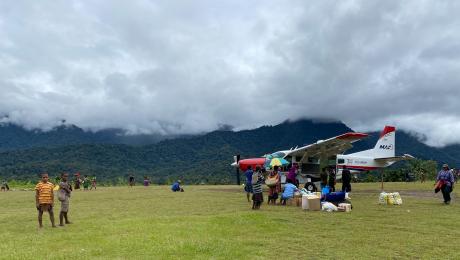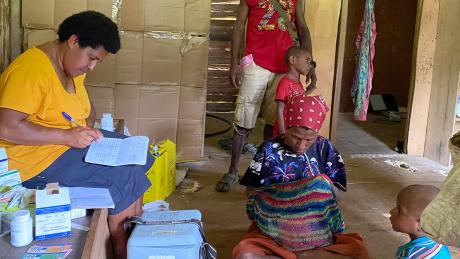
“Treating the individual patient is important, but a much bigger impact is achieved by health education and prevention of sickness,” reflected Dr Diana Zwijnenburg as she returned from the health patrol to remote Malaumanda.
The first week of April, we went on Health Patrol to Malaumanda. It is a very remote place, about 30 minutes flying northwest from Kompiam. There is no mobile reception, and I am still not sure where exactly this place is located.
Preparing well for the patrol
It was my first time going to such a remote place, and I was advised to bring everything that we may need. I prepared a huge list, which included things like all medications, immunisations, syringes, bandages, etc. But also items such as scales, measuring tape, testing kits (for pregnancy, Malaria, HB), stethoscope, and portable ultrasound.
Then, of course, our personal items, including food, clothes, bedding, and toilet paper.
Needless to say, we arrived with a stack of cargo.
Welcome and patient screening at the airstrip
Many people had already come out to greet us when the plane landed and they were more than willing to help us carry all the luggage to the hut where we were going to consult from.
About eight people were planning to fly back with the same plane to Kompiam. All had various health concerns. I was quickly seeing each of them in the shadow of the airplane wing, to assess if they really needed to go and were not wasting their time and money. However, after seeing them all and discussing that at least half could stay back in Malaumanda and that we would be more than capable of helping them here, it became apparent that their intention was to go, anyway. So, they all boarded the plane and left.
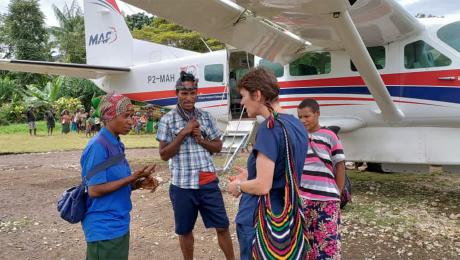
More a shed than a clinic house
The little clinic house had obviously not been used for quite some time. It was dusty, very messy and there were holes in the floor. We briefly considered doing clinic outside but decided against this because of expected afternoon rains. Whilst the community was informed of our arrival and plans, we spent the next hour tidying the hut and making it into a little clinic with a dental corner, a medical corner, and a child health/immunisation corner. We unpacked some of the boxes and I set my ultrasound up in the dark back room, which provided some privacy - something that is hard to come by here in PNG.
Clinic started slowly in the afternoon, with patients trickling in. It was apparent that there was an outbreak of Malaria, with many patients testing positive. This prompted us to get ourselves coated in a nice thick layer of mosquito repellent before the malaria mozzies come out, late afternoon. We gave many immunisations, treated all the Malaria cases, and did some more setting up for the next day.
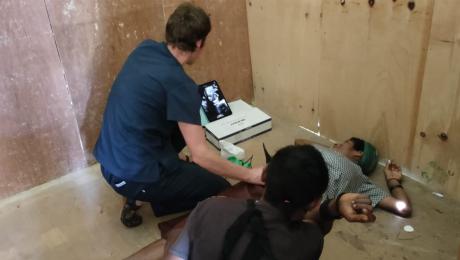
Gold panning instead of vegetable planting
The headmaster and his wife kindly hosted us and we had rice with noodles for dinner. We were wondering why there was nobody out there selling their garden produce because we would have loved buying some veggies to go with our food. Normally, a little community has women selling their fruit, veggies and sweet potato. But here, nobody was selling any products.
The headmaster informed us that community life has changed a lot since mining companies paying the local people to look for gold. They get paid a relatively large amount for this work, which means that all the men are now busy all day at the river, breaking up stones.
The women, who used to plant and grow food in their gardens, are now also at the river panning for gold. This means that there is almost no local food and produce. There is plenty of money though, but not much to buy.
Malaumanda has three local stores, where the families spend their money buying food. However, they only sell white rice, noodles, stock cubes, cordial and soft drinks. This is the taste that PNG people like and most are not aware of the poor nutritional value and the long-term health impacts of this food.
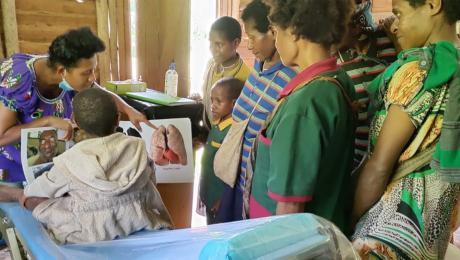
Nutrition change
We were sad to hear this and his story was confirmed the next day when we saw that most children had badly decayed teeth and had nutrient deficiencies. So, apart from seeing many sick patients, we also did a lot of health education, trying to make the people aware of the impact that these foods have on their and their children’s bodies.
The situation is almost equal to when the industrial revolution started in Europe, which also came with severely negative health impacts. This was not known at the time but became apparent when it was too late for many. As outsiders, we see this community, chasing after gold and money and not being aware of the consequences on their and their children’s health.
Immunisations, malaria and mothers to be
The rest of the day was filled with seeing many people, who had now suddenly arrived from surrounding places. We gave over 80 immunsations, saw 72 patients, of which a third had Malaria, and also checked 5 antenatal women, all coming for their first antenatal visit and most were already in their third trimester. They all intended to deliver in their village, so we gave them a birthing kit and supplied them with a mosquito net.
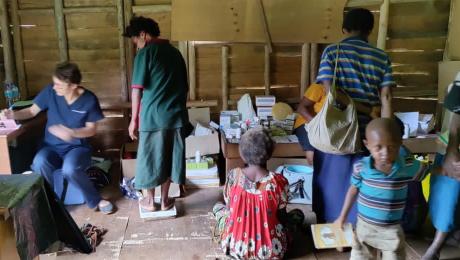
Covered in sweat and dust
By the end of the day, we were very smelly and sticky. Covered in a mix of mosquito repellent, sweat and dust, we were sure that no mosquito was able to penetrate this but still managed to end up with a few bites. There is no shower, and the river is too far away. In a little open rainwater barrel was some water we could use. So, we splashed our faces and washed our hands and the rest was done with deodorant.
Encouraged by godly fellowship
In the evening we saw various people walking to the little church close by. Keen to learn more, we followed them and ended up attending a pre-Easter Bible study. How encouraging to see so many people, including many young men being present! The teaching was in the local language, which we neither speak nor understand, but the presence of the Holy Spirit was evident and the songs were universal. Thank you, God, for this encouragement!
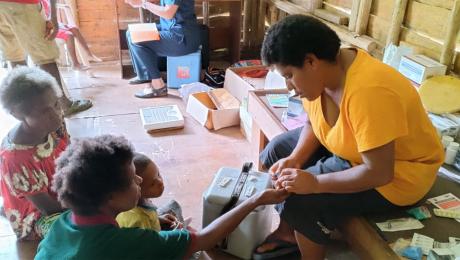
The bigger picture of rural health care
I am slowly becoming more aware of the issues here in PNG and this patrol to Malaumanda was a real eye-opener.
Treating the individual patient is important, but much bigger impact is achieved by health education and prevention of sickness. This has now become a priority and I have started working on teaching materials to facilitate this during my next health patrol.
Thank you
A big thank you to MAF who picked us up after these three days and flew us back to Kompiam. Dusty, smelly and very tired, we probably were not the most pleasant passengers. Also, a big thank you to the New Zealand Government who sponsored this health patrol flight to Malaumanda!
